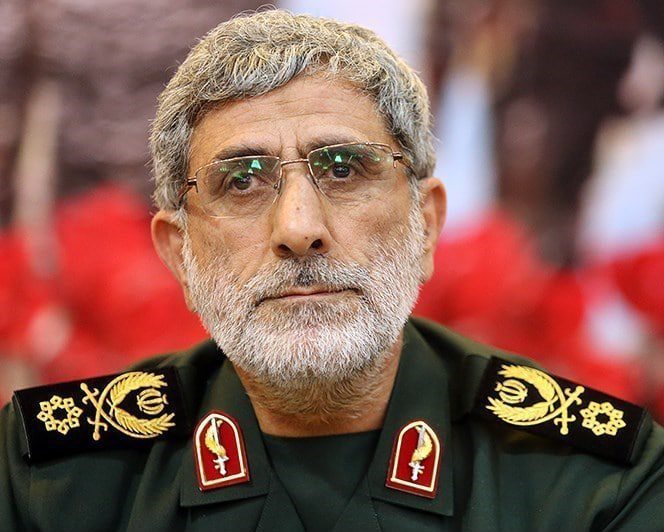Esmail Ghaani plays a key role in many conflicts. We explore his life, tactics, and role in shaping the politics of the Middle East.

Just days after the United States (US) assassinated Qassem Soleimani, commander of Iran’s elite Quds Force, on 3 January 2020, Iran’s Supreme Leader Ali Khamenei appointed Soleimani’s deputy, Esmail Ghaani, to replace him.
Although a respected figure within the Islamic Revolutionary Guard Corps (IRGC), of which the Quds Force is part – earning him nicknames such as the ‘shadow commander’ and the ‘thinking brain’ – Ghaani, unlike his predecessor, was largely unknown outside Iran. As such, his appointment was soon followed by the question: who is he?
Information about Ghaani is scarce especially when it comes to his personal life. Born on 8 August 1957 in the holy city of Mashhad, he joined the IRGC soon after its establishment in 1979, the year of the Islamic Revolution. As he put it, “I was in my 20s when the revolution triumphed and, like many, I took part in it.… Afterwards, I wanted to be in a position to do something in the service of the revolution.”
After joining the IRGC, he started his military training. When the Kurdish rebellion broke out in the early 1980s, he was sent along with many other IRGC members to fight the secessionist movement.
Having gained valuable battlefield experience, he then went on to prove himself during the eight-year Iran-Iraq War in the 1980s, when he was put in command of the Nasr 5 and the Imam Reza 21 divisions. Following the end of the war, Mohsen Rezaee, then head of the IRGC, appointed Ghaani as the commander of the eighth operational unit in the corps’ ground force in Mashhad.
The Quds Force was established during the 1980s as an external action force focusing primarily on operations within Iraq against the Baath regime. Over time, the force also became involved in conflicts outside Iraq and, under Qassem Soleimani post-1999, became one of the IRGC’s most effective units.
Having been comrades on the battlefield in the 1980s and then fellow IRGC commanders, Soleimani and Ghaani were close friends. Appreciating Soleimani’s strategic mind and effectiveness during and after the Iran-Iraq War, Ghaani saw the Quds Force as an ideal avenue to stay close to Soleimani as well as to advance his own worldview of supporting the oppressed beyond Iran’s borders. He once said, “When we started defending Islamic countries, we were doing our divine duty…. Because of that, God protected Islamic Iran in the face of many dangers.”
He joined the Quds Force in 2006, and despite being the same age and with almost the same years of military experience as Soleimani, he nevertheless welcomed his friend’s proposal to become deputy commander of the force.
As a unit operating beyond Iran’s borders, Ghaani saw the Quds Force as a “force of light” combatting the darkness of the oppressors. In one speech, he underscored the role Iran played vis-à-vis the US, saying that had it not been for the Islamic Republic and Iran’s efforts during the Iran-Iraq War, the US would have burned the entire region.
As he had done in the IRGC, Ghaani soon made a name for himself in the Quds Force. Although always overshadowed by the much more charismatic Soleimani, Ghaani was quickly noticed by both friends and foes. As such, after the Arab Spring in 2011, his name was added to the US’ terrorist list for his position as the thinking brain of the so-called ‘axis of resistance’ – an alliance of state and non-state actors across Iran, Syria, Lebanon, Iraq, Palestine and Yemen. He has regularly been praised by military leaders for his role in and knowledge of the axis of resistance, which the spokesman of Iran’s armed forces said will continue to be utilized to further Iran’s geopolitical goals.
More recently, Ghaani has become known for his virulent rhetoric against the evil of US domination and Israeli occupation. Soleimani himself proposed Ghaani as his successor to the Supreme Leader who reiterated Soleimani’s vision for the Quds Force in the appointment letter.
Within this same line of continuity, Mohammad Hejazi was appointed as the new deputy commander. Hejazi has a similar military CV to Ghaani and also holds a PhD in strategic management. He was recently added to the European Union sanctions list and, according to Israeli sources, is actively involved in transferring precision-guided missile production capabilities to Lebanon’s Hezbollah group.
According to Ghaani, Soleimani’s bright path will continue. However, Ghaani is more assertive than his predecessor when it comes to facing off against rivals and enemies. This stance was obvious in his threats against the US after Soleimani’s assassination. “You killed him in a cowardly fashion, but we will hit back bravely,” he said. On another occasion, he promised to avenge Soleimani’s death.
Another difference between the two men relates to Soleimani’s gradual approach in responding to threats or attacks, like the ones carried out by Israel in Syria and Iraq, whereas Ghaani believes in massive retaliation to deter further attacks. As he put it, “Our enemies do not understand a language other than force, so we must stand firm against them; if we do our job well, all threats can be turned into opportunities.”
If Ghaani puts his words into action, the Quds Force under his leadership is likely to become an even more formidable unit.


